Wisdom
by Edward de Bono
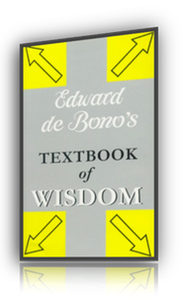
Amazon link: Edward de Bono's Textbook of Wisdom
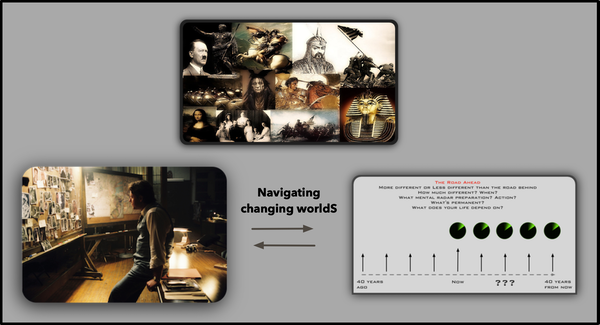
From The Daily Drucker
The Nature of Freedom
Freedom is never a release and always a responsibility.
Freedom is not fun.
It is not the same as individual happiness, nor is it security or peace or progress.
It is a responsible #choice.
Freedom is not so much a right as a duty.
Real freedom is not freedom from something; that would be license.
It is freedom to choose
between doing or not doing something,
to act one way or another,
to hold one belief or the opposite.
It is not “fun” but the heaviest burden laid on man:
to decide
his own individual conduct
as well as
the conduct of society ← (why bother?)
and
to be responsible
for both decisions.
“The Freedom of Industrial Man,”
The Virginia Quarterly Review

Power has to be used
“It is a reality.
If the decent and idealistic toss power in the gutter, the guttersnipes pick it up.
If the able and educated refuse to exercise power responsibly, irresponsible and incompetent people take over the seats of the mighty and the levers of power.
#Google : “Hitler’s Circle of Evil” ↑ ↓
Power not being used for social purposes passes to people who use it for their own ends.
At best it is taken over by the careerists who are led by their own timidity into becoming arbitrary, autocratic, and bureaucratic.” — PFD
Wise about wisdom

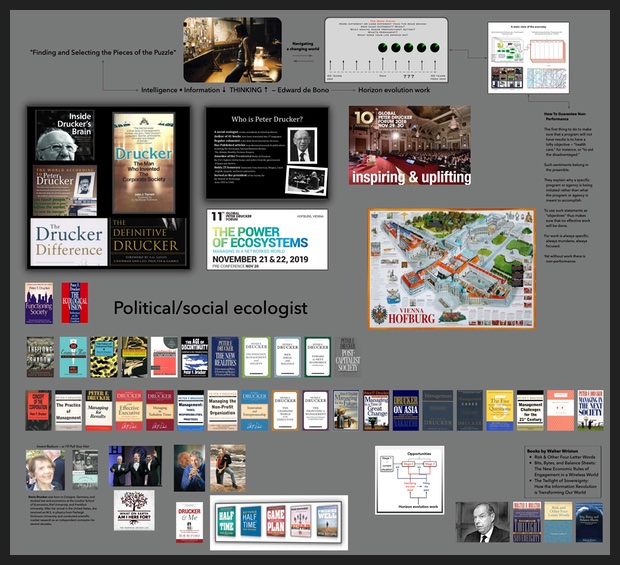
Contents

Wise about Wisdom overview
The richer and more complex the world in which you live, the more likely you are to be confused.
But it does not have to be so.
A fear that conscience like a nagging aunt is forever observing, scolding and directing behaviour …
Go through this book picking out the points that make sense to you and putting them together.
You can ‘graze’ through the book as often as you like or dip into it anywhere at any time
You are supposed to integrate what you read here with your own experience, rather than to choose one or the other.
You use what you find to be of value for you.
Wisdom is about awareness and possibilities: awareness of the world around; awareness of possibilities and #choices.
Perception is a matter of picking out the patterns that we have got used to seeing.
It becomes difficult to see things in another way unless we make the effort demanded by wisdom.
Wisdom is about breadth of perception.
There are three types of breadth.
1. How widely do we look? How widely do we see?
2. How deeply do we look? Forward, backwards and into detail.
3. How rich is our vision? This means possibilities, speculations, alternatives and different points of view.

Drucker: a political/social ecologist
Books by
Peter Drucker ::: Walter Wriston ::: Bob Buford ::: Rick Warren

A logic bubble is that bubble of perceptions and values within which everyone acts logically.
Possibility is the key to wisdom.
Possibility is the basis of creativity.
Possibility is the best antidote to arrogance.
Possibility drives exploration.
Richness of perception and design are based on alternatives.
So is effective action.
The design of alternatives is a key element in wisdom.
Wisdom encourages different thoughts and different values.
This gives a richness of perception.
There does not have to be a #choice of one and a rejection of the others
Parallel thinking is the opposite of traditional adversarial thinking.
Instead of judgement, both sides are laid down in parallel and then a way forward is designed.
Because wisdom encourages alternatives and possibilities, wisdom also encourages #choice according to your values.
If we determine our values then those values can determine our #choices and behaviour.
If our emotions come first then they determine our perceptions.
We only see things the way we want to see them.
We need judgement to find our way through life.
The danger is an excessive emphasis on rigid acceptances and rejections, and not enough attention to design.
Design is a matter of putting things together to achieve an objective and to serve our values.
Instead of searching for the standard solution we design a way forward.
Wisdom comes with growth.
But wisdom is also the fertilizer for growth.

A foundation for seeing the value of wisdom
Google: History of the World in Two Hours YouTube (the last ¼ of the video)
A Century of Social Transformation — Emergence of Knowledge Society
jump to awareness

Wise about wisdom (concept summaries)
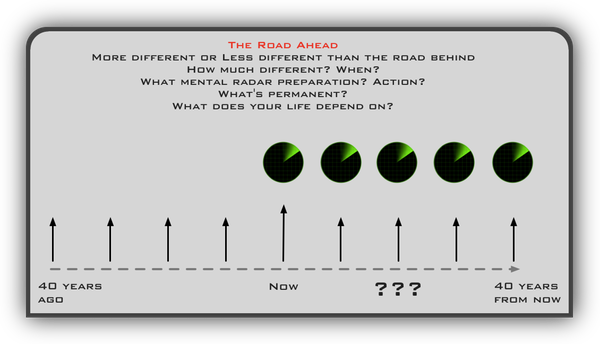
“I do not mean thinking in the sense of argument or analysis but thinking in the sense of ‘effectiveness’.
This is the thinking needed to get things done: objectives, priorities, alternatives, other people’s views, creativity, decisions, #choices, planning, consequences of action.
We have literacy and numeracy but we need ‘operacy’ or the skill of doing.”
Connect, connect, connect

Concept summaries on steroids ↓ or a tame PDF version
# 170 Awareness
# 170a Awareness — TAME version

Wisdom is about awareness.

If you know the road, life is easier.
If you can see the road, life is easier.
Outer World ::: Inner World
The road to Davy’s Bar
Thinking broad ::: Thinking detailed ↑ ↓
NYT Obituaries
Wikipedia: Actors, Authors,
Musicians, Musical groups,
Politicians, Athletes, …
If you can discover new roads, life is richer.
If you know you have a #choice of roads, life is richer.
Awareness can be applied to the outer world.
What is going on out there?
There may be times when the outer world is going to affect you, either as a threat or as an opportunity.
Seeing more clearly what is happening is always an advantage.
There are times when you are going to want to affect the outer world.
Seeing this world more clearly will enable you to design your actions more effectively.
Awareness can be applied to the inner world.
How do we see the world?
What are our habits?
What am I doing right now?
You know what you look like in the mirror.
Do you have a mirror for your inner world?
‘The purpose of thinking is to arrange the inner and outer world so as to serve and improve our values.’
If you do not know the ingredients, you are not going to be a very good cook.
If you do not know the processes of cooking you are not going to be a very good cook.
Awareness is much more than information.
Awareness is information as it relates to you.
# 170b Awareness — on STEROIDS
Try reading through the concept summaries (#170 - #183)
before clicking the links
embedded within EACH concept summary
Wisdom is about awareness
 If you know the road, life is easier. If you know the road, life is easier.
What exists is getting old
Why bother?
Dealing with risk and uncertainty
Finding and selecting the pieces of the puzzle
Information challenges
Connect, connect, connect
 If you can see ↓ the road, life is easier.
If you can see ↓ the road, life is easier.
sidebar ↓
Dealing with risk and uncertainty

Everything comes together in DECISIONS

History of the World in Two Hours (audio)
We know only two things about the future continue
The Alternative Tyranny
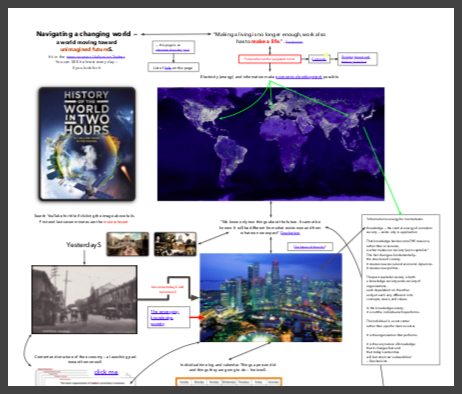
A brainroad ↑ ↓
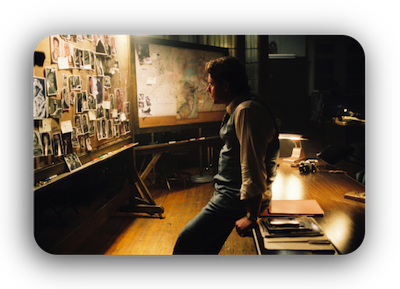
↓ ↑
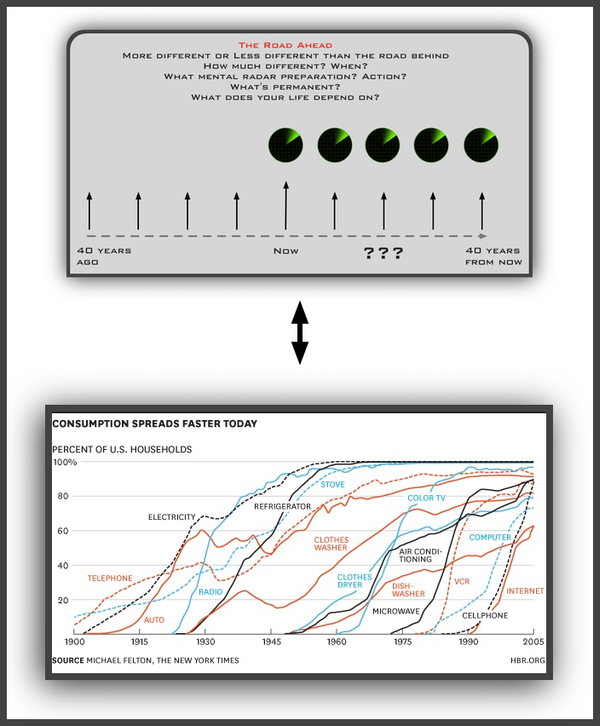
sidebar continues ↓
More and more people in the workforce—and most knowledge workers—will have to MANAGE THEMSELVES.
They will have to place themselves where they can make the greatest contribution; they will have to learn to develop themselves.
They will have to learn to stay young and mentally alive during a fifty-year working life.
They will have to learn how and when to change what they do, how they do it and when they do it.
Knowledge workers are likely to outlive their employing organization. ↓
About managing oneself
managing-oneself-overview.pdf
«§§§»
Peter Drucker’s life as a knowledge worker
Where do I begin to read Drucker?
3 kinds of intelligence and 9 action behaviors ↑ ↓ ← Niccolò Machiavelli ↑ ↓
The Emerging Knowledge Society !!!
The Daily Drucker !!!!
The Happiness Purpose
«§§§»
“We know only two things about the future ↑.
It cannot be known.
It will be different from what exists now and
from what we now expect”
This ↑ means the future isn’t going to be like today
which was created yesterday …
and yesterday
was the product of the day before yesterday ↓
… We are nowhere near the end of the turbulences,
the transformations, the sudden upsets continue :::
Long years of profound change
The Drucker Lectures
A Year with Peter Drucker
And
“The actual results
of (current) action
are not predictable ↓ ” continue
main brainroad continues ↓
 If you can discover new roads, life is richer.
If you can discover new roads, life is richer.
aim high
The road to Davy’s Bar
 If you know you have a #choice of roads, life is richer.
If you know you have a #choice of roads, life is richer.
Life direction — alternative approaches
 Awareness can be applied to the outer world.
Awareness can be applied to the outer world.
What is going on out there?
sidebar ↓
One thing is certain for developed countries — and probably for the entire world: We face long years of profound changes.
The changes are not primarily economic changes.
They are not even primarily technological changes.
They are changes in demographics, in politics, in society, in philosophy and, above all, in worldview. continue
«§§§»
(It’s in the news — the people and organizations I follow on Twitter @news4rte)
main brainroad continues ↓
 There may be times when the outer world is going to affect you, either as a threat or as an opportunity.
There may be times when the outer world is going to affect you, either as a threat or as an opportunity.
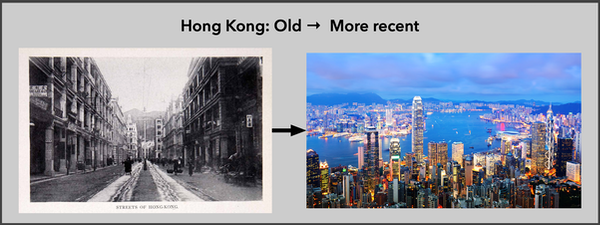
You can’t get there directly from back then — some development is needed
 Seeing more clearly what is happening is always an advantage. Seeing more clearly what is happening is always an advantage.
 There are times when you are going to want to affect the outer world. There are times when you are going to want to affect the outer world.
 Seeing this world more clearly will enable you to design your actions more effectively. Seeing this world more clearly will enable you to design your actions more effectively.
 Awareness can be applied to the inner world.
Awareness can be applied to the inner world.
How do we see the world?
What are our habits?
What am I doing right now?
You know what you look like in the mirror.
Do you have a mirror for your inner world?
 ‘The purpose of thinking is to arrange the inner and outer world so as to serve and improve our values.’
‘The purpose of thinking is to arrange the inner and outer world so as to serve and improve our values.’
 If you do not know the ingredients, you are not going to be a very good cook.
If you do not know the ingredients, you are not going to be a very good cook.
If you do not know the processes of cooking you are not going to be a very good cook.
 Awareness is much more than information.
Awareness is much more than information.
 Awareness is information as it relates to you.
Awareness is information as it relates to you.
“To know something,
to really understand something important,
one must look at it from sixteen different angles.
People are perceptually slow,
and there is no shortcut to understanding;
it takes a great deal of time.” read more
Sixteen Different Angles — a list of PDFs
Notes from Peter Drucker’s work on
developmental directions — a PDF
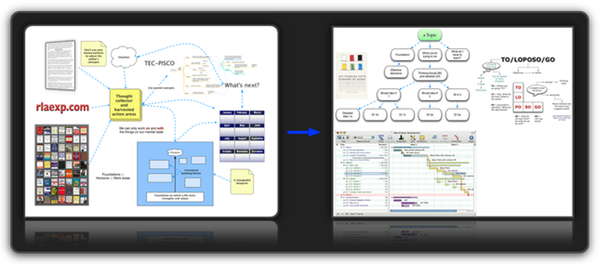
Larger view ↑
The University Art Museum: Defining Purpose and Mission
People decisions — the real control system
A thought-scape for developing your system
TO-LO-PO-SO-GO ↓ — a thinking landscape ↓
But first, something has to get on your mental radar (this page)
then what does that radar blip mean for you? ← who is you? →
then something like TO-LO-PO-SO-GO+
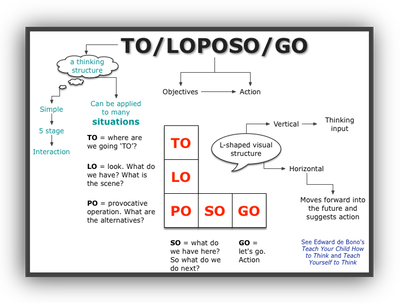

Freedom
If the able and educated refuse to exercise power responsibly, irresponsible and incompetent people take over the seats of the mighty and the levers of power … continue
Post-Capitalist executive interview
Knowledge Economy and Knowledge Polity
Managing Oneself — a REVOLUTION in human affairs
The Wisdom of Peter Drucker
Life 2.0
The Daily Drucker → book contents → page content → sample pages → social ecologist
The Prime Minister and the Prof — How does friendship
influence political power? The story of Winston Churchill’s close friend
and confidant — an eccentric scientist named
Frederick Lindemann — whose
connection to Churchill
altered the course of British policy in World War II.
And not in a good way. Revisionist History
Saigon, 1965 — In the early 1960s, the Pentagon
set up a top-secret research project in an old villa
in downtown Saigon. The task? To interview
captured North Vietnamese soldiers and guerrillas
in order to measure their morale:
Was the relentless U.S. bombing
pushing them to the brink of capitulation? Revisionist History
The brain is the thing → Humor, hindsight and insight, creativity and lateral thinking, lateral thinking as process, judgment and provocation, the word "Po", the stepping stone method, the escape method, the random stimulation method, general use of lateral thinking, the logic of lateral thinking … more
«§§§»
“Decision making is a time machine here
that synchronizes into a single time — the present —
a great number of divergent time spans.” Druckerism
«§§§»
We can make decisions only in the present,
and yet we cannot make decisions
for the present alone;
the most expedient, most opportunistic decision
—let alone the decision not to decide at all—
may commit us for a long time,
if not permanently and irrevocably.” — Chapter 11, MRE by Druckerism
«§§§»
“The future requires decisions-now. It imposes risk-now.
It requires action-now.” Druckerism
«§§§»
“The greatest danger in times of turbulence is not turbulence; it is to act with yesterday’s logic”. — Peter Drucker
«§§§»
The memo THEY don’t want you to SEE

# 171 Perception
Perception is not what the ‘eye’ sees but what the ‘brain’ sees ↑.

Outer world — inner world
When you read the word ‘ice cream’ you do not just see an arrangement of letters.
In your ‘mind’s eye’ you get an impression of the appearance, taste, texture and temperature of an ice-cream.
When you see a train pulling out of a railway station your perception is very different according to whether it is the train you have just missed or if that train had no relevance for you.
I have often written that we badly need a word in our language for ‘the way we look at things’.
The nearest word is indeed ‘perception’ but that is rather too tied up with vision.
We need a word to indicate ‘the way we see things in our mind’.
Outer world-Inner World
Wisdom takes place in perception.
Within perception the traditional rules of logic do not apply.
We are dealing with the logic of ‘flow’,
or ‘water logic’,
and not the logic of ‘identity’, or ‘rock logic’
(see Water Logic, Penguin 1994;
I am Right - You are Wrong, Penguin 1991
and the patterning system of the brain).
If our perceptions are wrong then no amount of logical excellence will give the right answer.
So it is a pity that almost the whole of our traditional intellectual effort has been directed at logic and so little at perception.
Logic will not change emotions and feelings.
Perception will.
Thought-scapes for the brain to SEE ↓
We live in the world we SEE
Outer world — inner world
Attention-directing tools are very powerful
Attention flow
Managing Oneself: a revolution in human affairs continue
This is far more than a social change.
It is a change in the human condition continue
You need a technologist
who has an awareness of
what goes on in other areas continue
The importance of accessing, interpreting, connecting,
and translating knowledge continue
From Analysis to Perception — The New Worldview
Description is not perception

#172 Broad
Cleverness is sharp focus, wisdom is wide angle.
Wisdom is largely about ‘broadening’ perception.
ONLY CONNECT, CONNECT, CONNECT … !!!
Thinking Broad and Thinking Detailed
Teach Yourself to Think :
Basic Processes —
Broad/Specific, General/Detail :::
Projection ::: Attention Directing :::
Recognition and Fit ::: Movement and Alternatives
Political/social ecology
From analysis to perception the new worldview
Social Needs and Business Opportunities
The Descent of Money
Most of the mistakes in thinking are mistakes in perception.
Seeing only part of the situation. for example
Jumping to conclusions.
Misinterpretation caused by feelings.
Helicopters that report back to local radio stations on traffic conditions at peak hours get a broad view of what is going on.
No motorist stuck in the traffic could possibly get this view.
With wisdom we seek to climb into a helicopter to get a broad overall view.
There are three types of ‘broad’.
The first type of broad is to do with ‘width’.
How widely do we see?
This means taking into account different factors, different people, different values and different needs.
This is the closest to the helicopter analogy.
We look around in all directions, not just where we are next going to place our feet.

The second type of broad is to do with ‘depth’.
This means looking forward and looking backwards.
We look backwards in time to seek explanations and reasons for what is before us.
We look backwards to examine past experiences, both our own and those of other people.
A Century of Social Transformation
Up to Poverty
We look forward to see the consequences of what is before us.

The Vanishing East
Management Challenges for the 21st Century
Knowledge and Technology
Knowledge Economy Knowledge Polity
Managing in the Next Society
This might be prediction in terms of what may happen.
Long years of profound change
It may also be looking for the consequences of any action we are contemplating.
We look forward from the immediate consequences to the long-term consequences.
The third type of broad is to do with ‘richness’.
Here we open up alternatives and different ways of looking at things.
We seek out the existing alternatives.
We imagine the different viewpoints of other people.
We make an effort to generate further alternatives.
These are alternatives of perception and alternatives of action.
We look for ‘might be’ and for ‘possibly’.
We go beyond ‘what is’.
So the aim of wisdom is to end up with a perception that is wider, deeper and richer.
There is a considerable element of creativity in broadening perception.
We need creativity to direct our attention to areas we might have overlooked.
We need creativity to generate alternatives.
We need creativity to put things together in different ways.
We need creativity to link up with past experiences which are not so obviously relevant.
Creative perception is part of perception.
One shoe salesman reported back that there was no market because no one wore shoes.
His companion reported back that it was a fantastic market because no one wore shoes.
If your eyesight is very sharp but you are looking in the wrong direction you will not see what you are looking ↓ for.
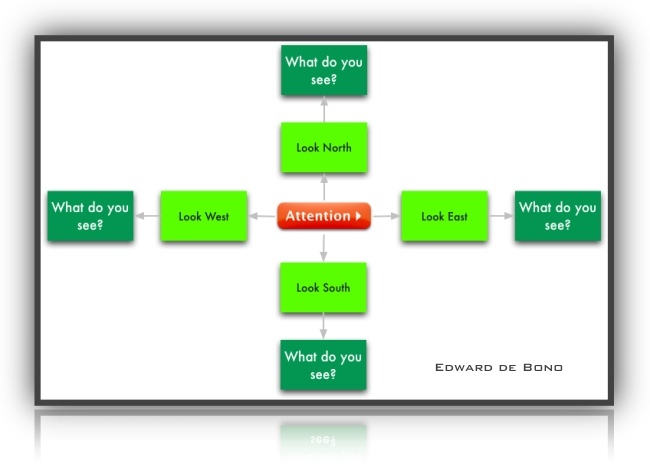
↑ An explorer is sent to a newly discovered island continue
Purposeful innovation continue
Never heard of … continue
3 kinds of intelligence and 9 action behaviors ↑ ↓ ← Niccolò Machiavelli ↑ ↓
Tomorrow always arrives
Dealing with risk and uncertainty
Try a word search for “concepts” or “ideas” on the memo page

# 173 Logic Bubble
‘Everyone is always right — no one is ever right.’
This quote comes from an earlier book (see Future Positive, Penguin 1990).
What it means is that at any moment everyone is acting logically within his or her ‘bubble’ of values and perceptions.
So at that moment in time that person is ‘right’.
In the broader, overall and objective sense
no one is ever right
because
we do not have a full understanding of the world or
the detailed consequences of our action far into the future.
The History of the World in Two Hours (audio)
Wisdom acknowledges the value and the reality of individual logic bubbles.

# 174 Possibly
It must have become obvious to anyone reading this book that ‘possibly’ and ‘possibilities’ are a central part of wisdom.
‘Possibly’ is valuable in two ways.
The first way is ‘possibly’ in exploration and creativity.
Just as the hypothesis is central to science, so our ability to hold something in mind as ‘possible’ allows us to examine, explore, develop and check out that possibility
Generating ‘possible’ courses of action allows us to choose between them.
Considering ‘possible’ designs allows us to work towards them.
‘Possibly’ is a key driver of progress, change and human thinking.
It is a pity that traditional thinking seems to have had little time for it, preferring the temptation of certainty.
The second way that ‘possible’ is valuable is that it is the best antidote to arrogance and to harsh judgements.
Arrogance can assert that there is only one way.
‘Possibly’ puts forward other ways.
Once thought, a thought cannot be unthought.
False judgements can only be challenged by ‘possibly’.
A judgement may be correct in terms of chosen information, chosen perceptions and chosen values.
So a logical attack on that judgement will not succeed.
But ‘possibly’ shows other possibilities of information, perception and values.
There may be no proof that improvement can be made in an area.
It is only our belief in ‘possible’ improvement that gets us trying to make that improvement.
Unless we become skilled in ‘possibly’ we shall always remain far behind the full use of our experience.
Only ‘possibly’ can pull us ahead so that we can put together our experience in different ways.

# 175 Alternatives
Richness of perception, ‘possibly’ and alternatives all go together.
We need to seek out and consider available alternatives.
These may be alternatives of perception, alternatives of explanation, alternatives of action and alternatives of design.
How else can we look at this?
How else can we do this?
Without alternatives we remain trapped in one channel.
No matter how reasonable a position might be, we need to consider alternatives.
Is your view the only possible one?
Is this course of action the only possible one?
Alternatives do not have to show themselves.
They do not have to ‘put up their hands’ like a child in a classroom who wants to be noticed.
Alternatives do not have to force themselves on your attention.
You have to go out and look for them.
Something happens and the immediate response comes to mind.
But you pause in order to seek out alternatives.
Sometimes you have to create alternatives.
The various deliberate techniques of lateral thinking are available for this purpose.
You need to say to yourself
‘Right here I am going to set out to generate some further alternatives.’

# 176 Plurality
It follows from ‘alternatives’ that we accept for consideration a number of different possibilities, alternatives, points of view, values, etc.
Traditional thinking says:
‘No, you cannot put that on the table unless you can logically justify its being on the table.’
There is a judgement gateway.
If something does not pass that judgement gateway it is rejected.
Wisdom says:
‘Put it on the table anyway and later we can see whether to use it, combine it with other things or not use it.’
Wisdom encourages plurality in order to get the ‘richer’ picture.
The Japanese word for yes is ‘hai’.
But when a Japanese says ‘hai’ it does not mean that he or she is agreeing with you.
It simply means that the person is awake and has heard what you have said.
That person has ‘put it on the table’.
Consideration comes later.

# 177 Parallel Thinking
This follows on directly from plurality.
Parallel thinking means laying down different views, values and possibilities in parallel.
Parallel thinking is the opposite of traditional adversarial thinking, where each statement has to be judged before being accepted.
In adversarial thinking, the ‘contradiction’ is a very important and powerful tool.
Both sides of a contradiction cannot be right.
One or other must go.
Parallel thinking allows both sides of the contradiction to be laid down in parallel without interfering with each other.
Later on, in the design phase, things can be sorted out.
Parallel thinking removes at once the urge to instant judgement.
You do not have to accept something as ‘right’ because you have not rejected it as ‘wrong’.
You simply accept it ‘in parallel’.
Sometimes you can accept it as ‘possibly’ but even when you cannot accept something as ‘possible’ you still accept it in parallel.
Husbands usually complain that wives take far too many clothes on holiday.
Husbands say that wives should decide in advance exactly what is going to be needed and to reject what is not going to be needed.
Husbands complain that wives take six outfits with them so they can have the ‘luxury’ of #choice at the holiday destination.
Parallel thinking is what the wives are doing.
They take everything along and then make the #choice only when it has to be made.
The husbands’ thinking is more like traditional Gang of Three thinking: accept or reject at this point before packing it.
Context
The book — a work in process

# 178 #Choice
If you have a map showing the different roads, then you choose the road you want to take according to your needs and values.
You may want the shortest route.
You may want the route with least traffic.
You may want the most scenic route.
You may want the road with the best surface.
You may want the fastest route (not necessarily the shortest).
It is not the purpose of wisdom to choose your values for you or to change your values.
Different readers of this book will have different values.
The purpose of wisdom is to allow you to apply your values effectively.
It is possible that over time wisdom may get you to alter your values.
Wisdom may suggest that a value you now hold high is really rather superficial.
But changing values is your task.
The important point is that at any moment you are making the #choice.
If you choose to let someone else or circumstances make the choice for you, that is also your choice.
If you prefer to take a step and then let the consequences make a choice for you, that is also your choice.
If you choose to follow a leader who is going to make the choices for you, that is also your choice.
If you do not want to make a decision — that itself is a decision.
Wisdom accepts that there are times when you do not have a choice or when you only have the illusion of a choice.
That is perfectly possible.
But wisdom suggests you examine those situations carefully in order to see whether this is really the case or an excuse for inaction.
The ‘edge effect’ suggests that the first step may be very difficult or very tempting.
Wisdom insists that you look forward into the future.
If the first step is tempting, wisdom may find the later consequences to be not so attractive.
If the first step is difficult, wisdom may find that the later consequences are very beneficial.
The whole purpose of wisdom is to lay out the inner world and outer world in such a way that you can make choices.
Everything come together in DECISIONS

# 179 Values
The purpose of wisdom is to serve your values, the values of your local community and the values of the world.
So values are central.
You can explore your values with wisdom.
You can develop a ‘broad’ sense of values in terms of width, depth and richness.
There are the positive values which you seek and the negative values which you seek to avoid.
In any situation there are the values of the actor (usually yourself), of the people directly affected by your action and of those indirectly affected (perhaps through the environment).
A broad map of values is what wisdom tries to draw.
There are the obvious values that are easy to remember.
Then there is a wide range of less easily noticed values.
These are often to do with relationships, position, status, etc.
Being given attention and recognition is a high positive value.
Boredom is a high negative value.
Not all values are equal. The Six Value Medals
Some have a higher priority than others.
Values may need sorting out.
There can be contrary values, either within the same person or between different persons.
We can seek to accommodate the contrary values, combine them together or alternate between them.
We can ‘trade off’ values, giving up some in order to enjoy others.
It is the role of the ‘design’ process to take the values and the broadly perceived situation and to design the way forward.
This may be a single design, or the result may be a set of alternatives.
You then have to choose between the alternatives, using your values and priorities again.
Design may involve working forward with the key values and then seeking to fit the other values in.
Design may involve trying to work forward with all values at the same time.
The elements of design are:
What is desirable?
What is possible?
What are the models?
What are the difficulties?
Is this satisfactory?

# 180 Emotions and Feelings
Wisdom acknowledges the validity and powerful reality of emotions and feelings.
Wisdom attempts to use them for their value and to avoid their negative effects.
Overreaction is one obvious negative effect.
So is biased perception.
Imagine a square tray suspended by a spring at each corner.
In the centre of the level tray there is a motionless ball.
A simple channel in the surface runs from the ball to each of the sides.
Which of the four channels will the ball follow?
You put some weights on the tray in one area.
The tray tilts in that direction.
The ball rolls down the channel that benefits from the tilt.
In a similar way our feelings and emotions alter the chemical balance in the brain so that certain areas are more sensitized and therefore ready to be activated.
Our perception then follows this sensitization or ‘biasing’.
It is not that we ‘choose’ to see things in a way that fits our emotions.
That is the ‘only’ way we can perceive at that moment.
We therefore need to recognize this biasing property of emotions and make a deliberate effort to bring to the surface some alternative perceptions.
They will not just occur by themselves.
Logic is unlikely to change emotions and feelings, but changed perception can.
Emotions and feelings overlap with values but are not always the same thing.
Your material value system may tell you that you have done well to sell your house at a large profit.
Your feeling may be one of sadness as you move out of the house.
You may even feel delighted when the failure of your business frees you up to do other things that you have always wanted to do.
Awareness of the ‘edge effect’ may distinguish between temporary feelings and the more valuable long-term ones.

#181 Judgement
We can only move through life because the judgement of ‘recognition’ tells us at every moment
what things are;
what things to seek;
what things to avoid;
what things to use as means to get other things.
Without judgement we could not proceed at all.
The danger lies in the harsh, quick and rigid judgements that we require of ourselves and that are required by our traditional thinking habits.
Too often we use stereotypes to ease our judgement.
Too often we put up false either/or #choices to force ourselves, or others, into a certain position.
All this is an integral part of the Gang of Three thinking system, with its emphasis on:
rejection of the ‘untruth’
the search for absolutes
and an inclusion/ exclusion box type of logic with the avoidance of contradiction.
This is an excellent system for many purposes but it has its limits and its dangers.
In a changing world the ‘boxes’ derived from the past may no longer be adequate to describe a changed present.
The dangers of judgement lie both in the rejection aspect and in the acceptance aspect.
Something rejected drops out of attention and perception.
It is no longer an ingredient in our thinking.
Something accepted may be accepted too wholeheartedly, when acceptance should be milder, doubtful or related to circumstances.
While acknowledging the practicality of simplistic black/white judgements, most people are coming to realize that the world does not work that way.
If you choose to take a black and white photograph of the world this does not mean that the world has no colors.
Instead of judgement the emphasis is on ‘design’.
How do we put things together in order to satisfy our values and needs?
Design may be much more difficult than judgement but the results will be better.
Many problems can be solved by analysis.
You identify the cause of the problem and then you seek to remove that cause.
But when the cause cannot be found or, if found, cannot be removed, then we are paralyzed because more and more analysis will not solve that problem.
We need to be able to ‘design the way forward’, leaving the cause in place.
While we are excellent at analysis we are not nearly so expert at design — because design requires creativity.
Parallel Thinking

# 182 Design
How do you design a meal?
How do you design a dish?
People are designing things every day.
Design is not something which only architects and dress designers do.
There are times when design may be complicated and difficult but most of the time it is relatively easy.
How do you put things together to achieve what you want?
It is true that in traditional thinking you may seek to put together the ‘thesis’ and ‘anti-thesis’ in the process of ‘synthesis’.
This means that you seek to combine opposing views.
But this is only one small aspect of design.
There may be alternatives which are not present in either point of view.
There are times when the combining of opposing views is enough, but in general design is a much broader process.
With wisdom we seek to design the way forward rather than ‘judge’ the way forward.
What is the purpose of design?
To satisfy our own and other people’s values, in a practical way.
Traditional education systems put far too little emphasis on design.
There is a belief that the ‘lawyer-type’ search for the truth of the Gang of Three is sufficient.
Arguments around this matter make use of exactly those habits which the argument is trying to change.
It is like speaking French to teach the French to speak English.
Design is the necessary final stage of parallel thinking.
We lay things down in parallel in order to provide the ingredients for design.
Sometimes the outcome is obvious and reveals itself.
At other times a more deliberate design process is required.
Does this mean that design is always better than judgement?
Not at all.
That would be contrary to the spirit of wisdom.
There are times when judgement is required.
There are times when judgement is faster and better than design.
There are times when judgement is needed even within the design process.
In the end judgement is required to assess and choose the outputs from design.
We come back to the ‘salt curve’.
No judgement is bad.
Some judgement is good.
Excessive judgement is bad.
What do we mean by ‘excessive’?
The belief that judgement is sufficient by itself.
It is only that arrogance which needs challenging.
Just as we need a better word for ‘perception’, we also need a better word for ‘design’.
The word ‘design’ has strong connections to interior design, graphic design, dress design, etc.
All these suggest visual appearance and, perhaps, something added on to the essentials.
In its broadest sense design means ‘putting things together to serve our values’.
Consider two architects.
The first architect sits in his office with a great folder of standard designs.
The client goes in and explains his or her needs.
The architect pauses.
Then, like the doctor diagnosing measles, the architect says: ‘It is design number 71 that you will be wanting.’
So the architect opens the file at page 71 and shows the client what he or she will be getting.
The other architect listens carefully to what the client wants in terms of living space, use, access, working environment, storage, cost and appearance, and then asks the client to come back at a later date.
The architect then sets out to design a house.
It is true that this design may resemble other designs.
It is true that the designed house may contain sub-elements that are standard.
Nevertheless, there is a design effort.
We have got far too used to considering only the ‘doctor model’ of the first architect, who seeks to recognize standard patterns, instead of considering the ‘architect model’ of the second architect.
The reason we have done this is that the historic tradition of thinking in the Western world was concerned with ‘discovering the truth’ (as required in theology) rather than in ‘designing for value’.
One of the difficulties of design is that we feel compelled to ‘design for perfection’.
How can we get this absolutely right?
This makes design very much harder than judgement.
As a general policy it is best to aim for a ‘simple and practical’ design.
Then you seek to improve this design.
If you cannot improve the design then use it as it is.
Knowing that a ‘judgement’ is right is almost an emotion.
The brain is set up to make judgements.
When we recognize something, the processes in the brain provide a sort of ‘click’, just as humor generates a laugh.
Occasionally this happens with design.
At other times our emotions start to come into play.
We get to like the design.
We like it more and more.
At other times we are left to make the practical #choice between designs, none of which inspire us.
Not all meals have to be memorable experiences.
Most meals are designs for a practical purpose.
They achieve that purpose.
This does not exclude excellence but it does not demand excellence on every occasion.
Everything come together in DECISIONS

# 183 A new super-pattern: What would Merlin do here?
If you find wisdom a ‘plus’, then use it.
If you believe that you are sufficiently wise already then congratulations either on your excellence or on your self-deception.
Wisdom is not instead of logic.
Wisdom is the operating system of ‘perception’.
Logic only begins when perception ends.
How are you going to put wisdom into practice?
You can read this book and reread it.
You can integrate some of the thoughts and suggestions into your own habits of thought.
What is put forward here is based on more than twenty-five years’ direct involvement in the teaching of thinking to schoolchildren, adults and the senior executives of some of the world’s largest corporations (employing up to 400,000 people).
As a practical step you may even wish to design for yourself a new super-pattern.
Just as King Arthur of the Round Table was always rushing off to the wizard Merlin for wisdom, so you can create your own Merlin.
What would Merlin do here?
What would the ‘wise person’ do here?
You would then use this super-pattern as you wished, just as you use the gears as you wish when driving a car.
Perhaps, in time, you will progress from a manual gear-shift car to an automatic one.
Wisdom will now become part of your behaviour.
If you find that wisdom has no value for you, give this book to someone who needs it as much as you do.

# 165 A wisdom learning curve
It is time to be wise about wisdom and to summarize this book.
‘Where ignorance is bliss, ’tis folly to be wise.’
This well-known quotation is itself a useful piece of wisdom.
The ‘wise’ in the quotation refers to knowledge.
There are times when it is better not to know everything.
The saying could be misinterpreted on the basis that it might indeed be better to be stupid and happy than wise and anxious.
The whole point about wisdom is that, used effectively, it reduces your anxiety.
The notion of ‘stupid and happy’ only refers to a very stable world in which nothing ever goes wrong.
If you are lucky enough to find such a world then stay there.
Otherwise you need wisdom to cope with difficulties.
There is always a concern with confusion.
You cannot possibly remember all the points in this book.
Many of them you know already.
So there is the concern that you will get confused and be worse off than before as you try to ‘be wise’.
There is also the fear of the paralysis of analysis.
You might analyze so much that you never make #choices or decisions and never take action.
There is the concern that when you first learn to ride a bicycle it is difficult and you can fall off and hurt yourself.
So wisdom may be painful in the beginning.
But wisdom is about ‘simplifying’ life.
The bicycle analogy is fine in terms of learning wisdom.
You have to make the effort and it may not be easy at first.
But the bicycle analogy is not appropriate with regards to falling off.
Here we are better off with the ‘ice-cream’ analogy.
You taste it and you like it.
You want more.
The richer and more complex the world in which you live, the more likely you are to be confused.
But it does not have to be so.
# 166 Traditionally, wise people have lived very simple lives
If you develop a gourmet taste for fine food but your finances only allow hamburgers, are you not going to be more disappointed than before you developed that taste?
If you do indeed become wise but your life is so dull and uneventful that there is nothing to be ‘wise’ about, are you not going to be frustrated?
Traditionally, wise people have lived very simple lives.
Their wisdom has allowed them to choose simplicity.
So a simple life does not exclude wisdom.
# 167 Far better to think of wisdom as a ‘pair of super-spectacles’
There may be a fear that a consciousness of wisdom will develop into yet another ‘conscience’.
Like a nagging aunt there will be part of your mind that keeps telling you to ‘wise up’.
This will be another super-pattern that comes in to advise on #choices, decisions and reactions.
Do you want a nagging aunt?
Since you are ‘designing’ this super-pattern you do not have to design it as a ‘nagging aunt’.
Far better to think of wisdom as a ‘pair of super-spectacles’.
When you choose to put them on, the world becomes much clearer and all the details become more visible.
You choose to put on these spectacles whenever you want to.
You might find that you have then trained your eyes so well that you can now see clearly without consciously having to put the spectacles on.
A fear that conscience like a nagging aunt is forever observing, scolding and directing behavior …
# 168 Working with this book
Read and reread this book.
Dip into it whenever you want to.
Read only one paragraph.
Read a page at night to put you to sleep.
It is a book for grazing, not for devouring.
It is not a book you read through in a rush and then say: ‘I have read it.’
You are supposed to integrate what you read here with your own experience and wisdom.
This integration takes time.
You are not standing looking at a picture — you are in the picture.
There is no greater waste of time than to read through this book ‘ready to disagree’ with as much as possible of what is written.
That is just the childish self-indulgence that we too often esteem as criticism.
We need to replace that traditional idiom of the Gang of Three with the analogy of a ‘mine’.
You work the mine.
You get as much out of it as possible.
You may have to process what you get out of the mine.
It is up to you to find and make value.
That there should be differences of opinion and different perspectives is to be expected.
It is part of wisdom to expect plurality.
It is not part of wisdom to suppose that, by definition, your point of view is the only possible one.
If by reading this book you define more clearly for yourself your own model of wisdom — which is different from mine — then good luck to you.
Go through this book picking out the points that make sense to you and putting them together.
You can ‘graze’ through the book as often as you like or dip into it anywhere at any time
You are supposed to integrate what you read here with your own experience, rather than to choose one or the other.
You use what you find to be of value for you.
# 169 About things to avoid and things to seek out
From time to time in this book there are suggested things ‘to do’ and also suggested things ‘to don’t’.
There are things to avoid and things to seek out.
There are certain traditional habits we have developed which may make wisdom impossible.
Just reducing the dominance of such habits is itself the use of wisdom.
There are other things, like ‘possibility’, where we need to develop new habits or encourage the ones we have.
Do you make harsh stereotyping judgements?
Perhaps you should be conscious of that habit.
Do you make an effort to generate and consider alternatives?
Perhaps you should seek to do this more often.
There is no need to list the ‘do’s’ and ‘don’ts’.
As you read and reread this book the overlays and repetition will make these points for you.
return to list

Now and then the ‘edge effect’
# 33 Wisdom and now/then
One of the prime duties that wisdom is called upon to perform is to cope with the problem of ‘now’ and ‘then’.
The youngster drops out of school to earn good money and to have a less boring time.
That is ‘now’.
Later the earning capacity of that youngster is substantially below that of his classmates who got more education.
You meet and get swept off your feet by this charming Romeo with dashing looks, more confidence than anyone you have ever met and a fast sports car.
Later he is a boring, lazy, womanizing slob.
The bull cannot leave the field because there is a thin string-like wire and if he touches the wire he gets a sharp electric shock.
He stays well away from the wire.
There is no fence around the house but the dog does not stray.
She knows that if she approaches the boundary then the little box she carries gives her a sharp shock.
A woman in a bad marriage has decided to get out but cannot face the moment of telling the bad-tempered husband.
# 34 About the ‘edge effect’
The ‘edge effect’ works both ways.
There is something marvelous that you want to do but you cannot do it because the very first step is so very difficult.
Your future career depends on your phoning someone — but you are too shy to phone.
The other way round, there is something which is immediately enticing but the long-term effect is bad.
You smoke your first cigarette because it makes you feel grown up and ‘one of the gang’.
Later in life when you are trying so hard to give up, you wish you had never started.
A journey of a thousand miles starts with one pace.
If you are unable to take that pace the rest is unimportant.
The pull of an immediate temptation is strong, as any reformed alcoholic knows.
Medicine tastes very bad.
It is truly horrid, just as an injection is truly painful.
So why do children take the medicine?
- because they are bullied into taking it
- because mummy might not love them if they do not
- because they believe the medicine will make them better.
People suffer considerable agonies at the dentist because:
- it seems necessary
- to look more beautiful
- to prevent future toothache
- to prevent future tooth loss.
In the ‘negative’ edge effect you do not take the next step because it is difficult.
In the ‘positive’ edge effect you take the next step because it is very easy to take.
# 35 Faith is the most powerful of super-patterns
Religion has been remarkably successful in controlling immediate action and resistance to temptation through offering very long-term benefits: you roast in hell or felicitate in heaven.
In Canada, and possibly some other countries, the death rate from lung cancer in women through smoking is now higher than that of breast cancer.
If you were to ask women they would choose to remove the threat of breast cancer through an act of their own choice, I suspect most women would claim that indeed they would exert that choice.
But smoking is a choice and they do not choose to make that choice.
It is therefore surprising that in Christianity the very long-term threat of hell or promise of heaven should be able to affect immediate action.
But religion also acts through much more immediate mechanisms.
There is inner guilt and conscience.
There is the fear that God will not love you any more.
There is the condemnation of peer pressure, since your peers may be watching to see how you behave.
There is the powerful mechanism of ritual.
If you omit the ritual this is like a spiritual insult.
Your lack of faith is immediately made tangible and visible to yourself and to others.
The most powerful effect of religion …
… is to provide those super-patterns which compete with the ‘immediate patterns’.
Such super-patterns prevent us succumbing to ‘temptation’.
Such super-patterns persuade people to make the ultimate sacrifice of their lives for their beliefs.
Faith is the most powerful of super-patterns.
Religion deals with very long term consequences, but these are made immediate through guilt or peer pressure.
# 36 Capitalism
Capitalism is another successful device for preferring long-term consequences over short-term gain.
You could spend the money and enjoy it.
Or, you could invest it in a machine which will earn income for you in the future.
There are 162,000 students (1995) in the University of California; 40 per cent of these students are of Asian origin.
Yet there is only 5.5 per cent of Asians in the population.
So 5.5 per cent of the population is providing 40 per cent of the university students.
The explanation is that ‘education’ is part of the investment culture of Asians.
You invest time, effort and family discipline in education.
That is an expectation and not a matter of choice.
In ethnic conflicts, as in the former Yugoslavia, you hear of atrocities against your group.
So you seek the protection of your local warlord.
Tit-for-tat atrocities are carried out.
All sides long for peace but at every moment they have to take action which makes that peace impossible.
There is a need somehow to break the continuity of the local fighting.
Capitalism means forgoing immediate consumption in order to invest for long-term benefits.
#37 Anger, aggression, fear, the edge effect, relating
It could be imagined that the biological purpose of anger and aggression might be to drive us through the edge effect.
There is something that needs to be done but you do not like doing it.
Anger drives you to do it.
Anger might replace the fear that otherwise held you back.
So you work yourself up into a ‘state’ in order to cross the ‘barrier’.
Conversely, fear acts as an edge effect.
Fear of taking the first step keeps us within boundaries.
Fear of the electric shock keeps the bull within the electric fence.
A stern tone of voice from father keeps the child from misbehaving.
Signals are often enough.
It is ironic that a human smile is a remnant of the aggressive baring of teeth in animals.
One animal bares its teeth to indicate that another animal is in danger of being attacked.
Perhaps the connection is that a smile means: ‘I am relating to you.’
The ‘relating’ is more important than the quality of the relationship.
# 38 Dealing with the edge effect is very much part of wisdom.
So we might summarize some of the different approaches.
The Culture Approach
Certain behavior becomes so much part of the culture (general, or within an organization or family) that you are not even aware of the edge effect.
The example of Asian students studying hard applies here.
The Awareness Approach
This is almost the opposite of the culture approach.
In the awareness approach you ‘identify’ the edge effect.
You make it very clear to yourself perceptually.
Once you know what you are dealing with it may become easier to cross some ‘ditch’ or to avoid some immediate temptation.
You say to yourself.
‘This is an edge-effect situation.’
The Consequences Approach
You spell out the consequences.
You direct your attention to the consequences.
The hope is that an awareness of the consequences will guide you over the edge effect.
If you know how harmful smoking might be then you do not smoke.
If you know how dangerous drugs are then you do not start.
In practice, the consequences effect is much weaker than it should be.
You always believe that the bad consequences ‘will happen only to other people’.
Looking ahead to the consequences.
If you push against the tower it will collapse.
Immediate Consequences
How can those remote consequences be made more immediate?
For religion, ritual, guilt, peer pressure all serve this purpose.
The approval or disapproval of someone close by can help.
There is a design task: how can we make the remote consequences more immediate?
If your skin turned yellow very soon after you took drugs then you would not take them.
Fashion and peer pressure are powerful but can go either way.
Fashion and peer pressure can get you to do things you ought to do but also to do things that are not helpful.
Super-patterns
These are the overriding patterns of self-image, religious principles, conscience, etc.
If they are strong and well cared for they can work very effectively.
The difficulty is that the other pattern still exerts its attraction.
It is like a reformed alcoholic still having the tempting drink in front of him and reminding himself, ‘I am a reformed alcoholic.’
A super-pattern is an overriding model which permanently seeks to alter behavior.
Alternative Pattern
This again is a design task.
Can we design another pattern which takes over?
The dieter who chooses to get a sense of achievement by seeing how much food she can leave on the plate is now working towards achievement.
The Emotion Approach
As suggested earlier, anger can get you to do things you do not want to do and fear can stop you doing things you do want to do.
The trouble is that it is rather difficult to switch such emotions on and off as required.
The Small-step Approach
If there is a difficult letter that you do not want to write then you tell yourself you are only writing a ‘draft’ version.
When you have written the draft you find it serves your purpose very well.
So you send it.
Real-estate agents sometimes want you to pay a small token deposit.
You do not want to lose this so you move on to the next stage and eventually buy the house.
Changing-context Approach
If you change the context completely then the fear and inertia that have held you back can disappear.
So if there is something that you know you have to do but cannot get around to doing then changing the context is a useful first step.
You might go away on holiday and make your decision somewhere else.
If you change the context then things fit in more easily.
# 39 It could be said that reconciling the immediate situation with the longer-term view is the essence of civilization.
# 40 Approaches to time usage
There are people who want to live only for today and have fun today.
Tomorrow will be coped with when tomorrow arrives.
If you are fit, healthy and have confidence in yourself then you will adjust to whatever circumstance arises.
This is an attractive philosophy provided ‘getting by’ and ‘having fun’ are sufficient.
They may well be for the moment.
But will they be later?
Young hippies and very old hippies are attractive, but it is not so much fun in between.
Then there are those who are forever ‘working for the future’.
For such people there is never a ‘now’ or ‘today’.
If they reach one stage then they must work towards the next.
If the enjoyment of work is a high value, this makes sense.
But if work is a means to an end, one has to ask when that ‘end’ is going to be reached.
Achievement is a value just as much as enjoyment.
There are personal choices as to how the two get mixed.
As always, wisdom is about balance.
Some people live for today and some only for a future which never arrives as it is always ahead.
The beach and the road
YouTube: A brief celebration of Edward de Bono's ideas on thinking
Note: ages, sociaeconomic group, level of engagement,
who paid for their attendance (employer)
and why (thinks they need it)
# 152 Limitations: beaches vs. roads
You can walk anywhere on the beach.
You do not have to walk.
You can sit and lie and watch the waves come in.
There is no road.
But the beach is limited.
A road heads in a certain direction.
You are confined to the road.
Your choices are limited.
You can choose the direction.
You can choose the combination of roads.
But the road restricts full freedom of movement.
# 153 Wisdom acquired, developed, used
Is wisdom like a suntan, like scrambling eggs, like a photographer's flashbulb or like an aspirin?
We make some effort to acquire a suntan.
For a while it is there and looks wonderful.
Then it wears off.
It is a memory.
You know you did have that tan once upon a time.
So the points made in this book may stay with you for a while.
And then, like the suntan, they fade from your mind.
Scrambling eggs is a skill.
It is not difficult to scramble eggs.
But it is difficult to scramble eggs really well.
You may learn the ways of wisdom.
You may use wisdom adequately or very well.
The skill remains with you — but you have to choose to use that skill.
Unlike the suntan it is not there all the time.
The photographer's flashbulb is used when ordinary light is not good enough for illumination.
You may choose to use wisdom when ordinary thinking seems not to be good enough.
How often you use the illuminating power of wisdom will depend on your assessment of the current lighting.
An aspirin is only of value when you have a headache.
You may regard wisdom as therapeutic only to be used when there is a real problem.
You follow along a road; the direction of movement is set out before you.
On a beach you can move in any direction.
# 154 About life direction — alternative approaches
A painter does not paint with her fingers, in the air with no brush, no canvas and no colors.
The full freedom of painting is not too seriously restricted by the need to apply color to the canvas with a brush.
These are specific tools which make possible the expression of the artist's vision.
How structured do we have to be in the use of wisdom?
There are people who have known what they want to do with their lives from the age of ten.
There are others who go through university and still wonder what they are going to do.
There are others who are content to drift about, taking each direction and each opportunity as it arises.
Can you get to a destination if you do not know where you are going?
The simple answer is that you cannot.
So you ought to know where you want to go.
The detailed plan may not be so important as the destination.
The more complex answer is that you can get to a destination even without knowing where you wanted to go.
You simply choose to make your destination the place where you happen to have arrived.
This is a post hoc destination.
Detailed plans give purpose, values, decisiveness and a basis for choice.
There is a way of monitoring achievement.
Where necessary the plan can be made flexible or changed.
There is a reason for every next step.
Plans, however, restrict choices and values to ones which were set down some time ago.
Plans freeze the plan-maker at the date the plans were made.
An alternative to a plan is 'evolution'.
Let influences and events mould the next steps.
Take advantage of all that is happening.
You may end up doing something you could never have planned to do.
I set out as a medical doctor but became interested in human thinking and perception as a result of my work in the more complicated systems of the body (glands, kidneys, lungs, circulation and their interaction).
Another alternative is to plan to get yourself into the best position to move in any direction that takes your fancy.
Just as an athlete works towards being fit and healthy with high stamina, so you plan to develop your skills and abilities to their fullest (including wisdom).
Many major corporations have given up long-term planning because in an uncertain world it is almost impossible to tell what is going to happen.
So they concentrate on being efficient, fit and lean, and then wait to see in which direction to move.
Another alternative is to decide that the hand that chance and circumstance have dealt to you is the hand you are going to play as well as you possibly can.
Another alternative is to make mini-plans which just take you a short way ahead.
Then you make another mini-plan, and so on.
Without a road and without a structure it is much more difficult to get anywhere.
The energy you put into a situation may be wasted and you are back where you started.
You may wish to reach a certain destination or you may wish to reach a point from which there is a choice of many destinations.
# 155 "Sensible decisions"
If at every moment you take the most sensible step, is this not enough?
A person falls over a cliff and lands on a narrow ledge.
The sensible thing is to lie still to avoid the danger of falling over the edge.
But lying still will not get you rescued.
Doing the most sensible thing at every step may not be a sufficient strategy.
What is the most sensible step?
'Sensible' is in relation to the immediate situation, the values, the possible consequences and the overall plan.
If everyone in the gang is being tattooed then that may seem the most sensible step at that moment in time.
Within a large framework it may not be so sensible.
Even when there is no specific overall plan, it is the role of wisdom always to consider the 'broader picture'.
Does this mean that there is no risk, no adventure and no fun?
Yes, it does.
So why would anyone want to be wise and bored?
Because wisdom chooses adventure and fun as value choices just as an explorer makes a value choice when setting off on an expedition.
You can choose to expose yourself to adventure just as you choose to go to a restaurant to expose yourself to the menu.
You can choose to go gambling.
The difference is that all these are now your choices.
Some people do not like the burden of choice.
Choice may mean rejecting something you like.
Choice may mean making a mistake you will later regret.
Choice may mean satisfying someone else's expectations.
If some random decision-maker decided what you were going to do then that might make life easier.
It should be easiest to decide when the choices are very nearly equal.
You cannot then go wrong because whatever you choose will be worth while.
You might even consider tossing a coin.
In practice these are often the most difficult choices, because choosing any one alternative now means giving up an almost equally attractive alternative.
At this point it is best to focus not on the benefits and values but on the deficiencies:
'I would be inclined not to choose that alternative because …
Young women are often advised by their magazines to focus on the negative aspects of a boyfriend who has just left.
That way they are told they will miss him less.
It is the purpose of wisdom always to consider the broader picture.
This applies both when there is no overall plan and also when there is.
The plan may need changing.
# 156 Ambitions
Where is the place for ambition?
Do we become hostages to our ambitions or are ambitions the 'tractor' that pulls us forward and out of the mud?
Ambitions are contracts for future values.
Your ambition might be to be a great writer.
Someone else's ambition might be to have the most fun possible.
Someone else's ambition might be to have a caring husband and four children.
Someone else's ambition might be to drop out and simplify life.
If you want food you go to the supermarket and buy it, or you grow it or you beg for it (as young Buddhist men have to do for a while).
Ambitions are the purchasing effort you make to get to your values.
Your ambition might be to have a 'peaceful unambitious life'.
It is surprising how much real effort that ambition could take.
When you find making a decision difficult you may seek to avoid that difficulty by making no decision.
In fact that itself is the decision.
The decision to 'do nothing' is a definite decision, which will have its own consequences just as any other choice would have had consequences.
'No decision' is a valid choice provided you know that is your choice.
So having 'no ambition' is itself an ambition.
# 157 Seek ways of trying things out
There are followers and there are leaders.
There are loners and there are team members.
Can you choose what to be?
Is it all determined for you by some psychological profile?
Eventually, you will learn from your desires, your values and your experiences.
You should never 'rule yourself out' of a possibility.
People who have never thought of themselves as leaders suddenly find they are good at it and enjoy it.
Lack of confidence and lack of opportunity to try something out restrict our notions of what we can and cannot do.
Seek ways of trying things out.
# 158 Routines
Some people join the army not because they want to fight but because they like the structure and discipline.
You make the single decision to join and thereafter you are carried along on the values, routines and requirements that are in place.
There is nothing wrong with routines except the feeling that you cannot change them or escape from them.
Some of the wisest people set up routines.
If you had to wait until you felt inspired before sitting down to write you would achieve very little.
If you set up a writing regime which you stick to firmly, then you will achieve a lot.
There are times when your writing will feel less than inspired.
That feeling may indeed be justified.
Over time, however, you will get a lot done.
You can always drop or redo the less inspired pieces.
There are those who want to find direction by being led.
There are those who want to lead.
And there are the loners who simply want to pursue an individual direction.
Routines mean that you do not have to think about the next step, so you are freed to use your thinking on other matters.
Routines can be liberating.

“Why is ‘thinking’ important? awareness — seeing the road ahead
Because without thinking we can only act in the following ways:
1. Act purely on instinct like insects.
2. Repeat the usual routines.
3. Do what someone else > decides > and orders.
4. Follow the emotion of the moment.” — Edward de Bono
If you don’t design your own life THEN someone else will do it for you!!!
The Alternative to Tyranny
Dealing with risk and uncertainty
Everyday thinking is what fills in the time when you are neither asleep nor dead.
Thinking is that waste of time between SEEING something and “knowing” what to do about it.
Knowing what to do
The purpose of thinking is to deliver to you the values you seek … continue
“If you do not care
to understand something,
then you must borrow an explanation
from someone else (and they will deceive you)
or do without one.” continue
#wlh #thinking
“One can … never be sure
what the knowledge worker thinks—and yet
THINKING !!! is her/his specific work;
it is his/her “doing.”” ↓
Dealing with risk and uncertainty ↓
What thinking is needed — now or later? ↑ ↓
Now and then the ‘edge effect’

Edward de Bono interview (12+ minutes) #audioplayback
Wisdom is largely about ‘broadening’ perception
… to know something important … (#sda on memo)
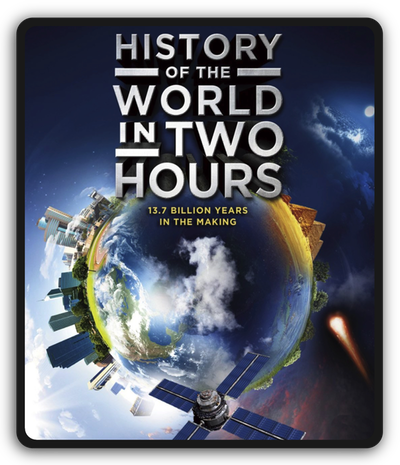
Finding and selecting the pieces
Connect, connect, connect
Getting a broader view !!! helicopter
DEALING WITH RISK AND UNCERTAINTY ↑ ↓
Most of the mistakes in thinking are mistakes in perception. an exploration #sda
 SEEING only part of the situation — insufficient #information #wb SEEING only part of the situation — insufficient #information #wb
Topics vs. realities ::: larger view ↓

#fastp
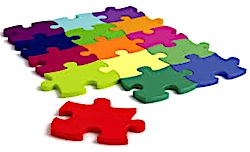

Three types of broad — width, depth, richness
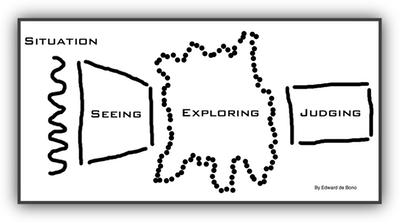
Once you see something you can’t unsee it
JUDGEMENT → Attention-directing frameworks
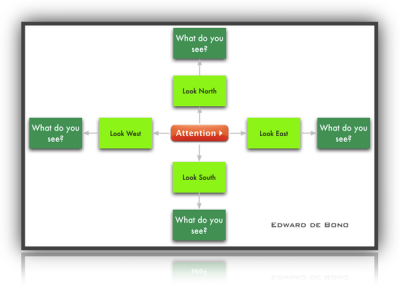

Now and then the ‘edge effect’ ↑
It’s easy to get lost without a map ↑
Creating a better “map” ↓
 The patterning system of the mind — the NEED for MANY competing patterns The patterning system of the mind — the NEED for MANY competing patterns
 Finding and selecting the pieces of the puzzle ↓ Finding and selecting the pieces of the puzzle ↓
“Alternatives don’t have to show themselves” ↓
 A big really picture A big really picture
A smaller element ↓
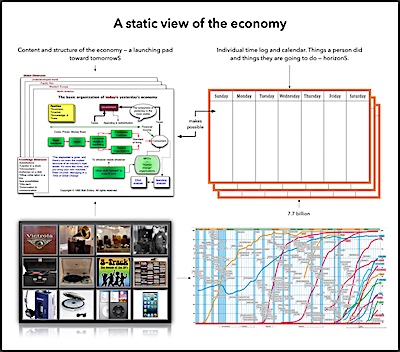
 “The terms knowledge industries, knowledge work and knowledge worker are nearly fifty (sixty, seventy, eighty) years old. “The terms knowledge industries, knowledge work and knowledge worker are nearly fifty (sixty, seventy, eighty) years old.
They were coined around 1960, simultaneously but independently— the first by a Princeton economist, Fritz Machlup, the second and third by this writer.
Now everyone uses them, but as yet hardly anyone understands their implications for human values and human behavior, for managing people and making them productive, for economics, and for politics.” — PFD
 The Second Curve — missing the turn to the future The Second Curve — missing the turn to the future
 The World: A Brief Introduction The World: A Brief Introduction
 Books by Walter Wriston Books by Walter Wriston
 Technology is about work: the specifically human activity by means of which man pushes back the limitations of the iron biological law which condemns all other animals to devote all their time and energy to keeping themselves alive for the next day, if not for the next hour. Technology is about work: the specifically human activity by means of which man pushes back the limitations of the iron biological law which condemns all other animals to devote all their time and energy to keeping themselves alive for the next day, if not for the next hour.
 “A change as tremendous as … doesn’t just satisfy existing wants, or replace things we are now doing. “A change as tremendous as … doesn’t just satisfy existing wants, or replace things we are now doing.
It creates new wants and makes new things possible.”
 Knowledge and technology Knowledge and technology
 No surprises No surprises
 Long years of profound changes Long years of profound changes
 The Five Deadly Sins The Five Deadly Sins
 A FREEDOM brainroad A FREEDOM brainroad
 T. George Harris — civil rights, politics, business, psychology, careers, self-development, health and spirituality T. George Harris — civil rights, politics, business, psychology, careers, self-development, health and spirituality
 Celebrating the life of Peter Drucker — audio by Rick Warren Celebrating the life of Peter Drucker — audio by Rick Warren
 Things don’t alway work out as expected. What are the implications for those impacted? Things don’t alway work out as expected. What are the implications for those impacted?
 The voyage of the St. Louis 1939 The voyage of the St. Louis 1939
 The really bad guys don’t always get what they deserve The really bad guys don’t always get what they deserve
 The good guys don’t always carry out their obligations The good guys don’t always carry out their obligations
 Intelligence, information, thinking Intelligence, information, thinking
 If you never change your mind, why have one? If you never change your mind, why have one?
Have a sign on your desk which says:
‘Same thinking as yesterday, last year or ten years ago.’ — life experience
 Parallel Thinking Parallel Thinking
 Water Logic — what does something lead to? Water Logic — what does something lead to?
 Think! Before It's Too Late Think! Before It's Too Late
 Practical Thinking — The black cylinder experiment and the world surrounding you Practical Thinking — The black cylinder experiment and the world surrounding you
 Textbook of Wisdom — if you can SEE the road ahead … Textbook of Wisdom — if you can SEE the road ahead …
 Attention directing frameworks — a place in the mind Attention directing frameworks — a place in the mind
 Intelligence ::: Information ::: Thinking combo pdf Intelligence ::: Information ::: Thinking combo pdf
 Three types of intelligence Three types of intelligence
 Dealing with risk and uncertainty Dealing with risk and uncertainty
 Information: Search not Think Information: Search not Think
 Windows of Opportunity #woo Windows of Opportunity #woo
 Information and Decisions Information and Decisions
 What Everybody Knows Is Frequently Wrong What Everybody Knows Is Frequently Wrong
 Time-life Navigation Insights Time-life Navigation Insights
 The memo THEY don’t want you to see The memo THEY don’t want you to see
 Why bother? Why bother?
 How can the INDIVIDUAL survive? How can the INDIVIDUAL survive?
 The INDIVIDUAL in entrepreneurial society The INDIVIDUAL in entrepreneurial society
 Managing Oneself — a REVOLUTION in human affairs Managing Oneself — a REVOLUTION in human affairs
 More than anything else we are responsible for our own self-development and allocating our lives More than anything else we are responsible for our own self-development and allocating our lives
 The second half of one’s life The second half of one’s life
 Who you really are and who you might become!? Who you really are and who you might become!?
 Jumping to conclusions Jumping to conclusions
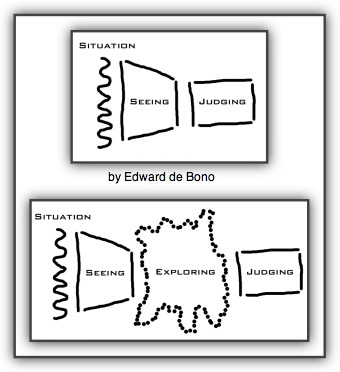
see above
 “Most people make the mistake of believing that because something is simple, obvious and sensible we do it all the time. “Most people make the mistake of believing that because something is simple, obvious and sensible we do it all the time.
This is not so at all.
We do not usually do even the simplest of things.” EDB
 Assumptions Assumptions
 Misinterpretation caused by feelings Misinterpretation caused by feelings
 What about feelings and values? What about feelings and values?
 What about beliefs? It is also true that beliefs can stand in the way of progress What about beliefs? It is also true that beliefs can stand in the way of progress
 Doing a PMI Doing a PMI
 Social ecologist Social ecologist
 Sixteen different angles Sixteen different angles
 Broad Broad

Perception provides
the ingredients for thinking ↓ #pta
↑ “If our perceptions are wrong
then no amount of logical excellence
will give the right answer.” ↓
Your thinking, choices, DECISIONS are
determined by
what you’ve “SEEN” ↑ …
“It is only our lack of complete information
that makes it necessary for us to think”
The traditional notion in education that information is sufficient is old-fashioned and dangerous
“In addition to information
we need #ideas.
Ideas are
the spectacles
through which
we look
at information.”
‘An #idea
can never
make the best use
of available information
because
information trickles into the mind
over a period of time
the idea patterns set up
cannot be as good
as if
all the information
arrived at once.’ continue

“One does not pay attention to everything.
And one acts
only upon what one is
paying attention to.
(A Century of Social Transformation)
The reaction may be #thinking or it may be action (which is only thinking that passes through our mouths or our muscles instead of our minds).
The world around is full of a huge number of things to which one could pay attention.
But it would be impossible to react to everything at once.
So one reacts only to a selected part of it.
The choice of attention area
determines
the action or thinking
that follows.
The choice
of this area of attention
is one of the most fundamental
aspects of thinking.”
Very powerful ::: TLN Insights ::: #adt #edb
The thinking
needed
to get things done:
Getting the RIGHT things done and avoiding the four realities of an executive’s situation that push them toward futility
Is it a problem or an important decision?
Career Performance or trivial pursuit
objectives, priorities, alternatives,
other people's views,
creativity, decisions, choices, planning,
consequences of action operacy

|
![]()
